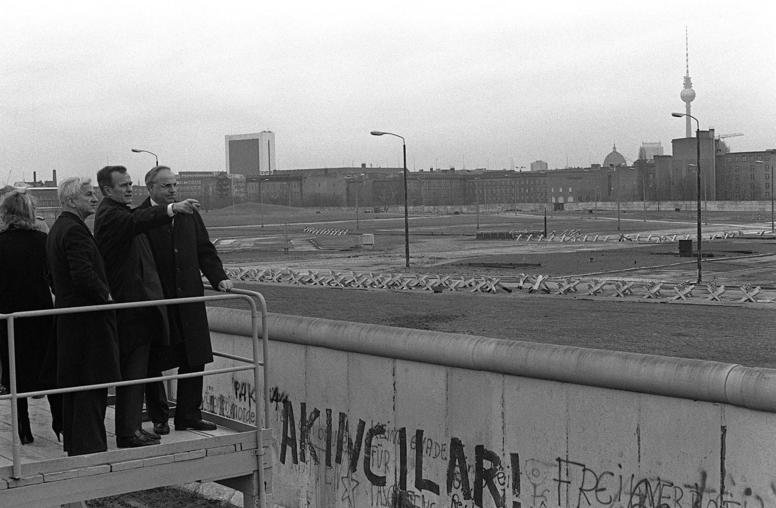Truth Commission: Germany 92
Truth Commission: Study Commission for Working Through the History and the Consequences of the SED Dictatorship in Germany
Duration: 1992 - 1994
Charter: Act No. 12/2597
Commissioners: 27
Report: Public report
Truth Commission: Study Commission for Working Through the History and the Consequences of the SED Dictatorship in Germany (Die Enquete-Kommission des 12. Deutschen Bundestages “Aufarbeitung von Geschichte und Folgen der SED-Diktatur in Deutschland“)
Dates of Operation: May 1992 - June 1994 (2 years)
Background: After the devastation of World War II, Germany was divided into four military zones. The three western zones governed by the Allies were known as the Federal Republic of Germany while the eastern zone became the German Democratic Republic. Political, economic, and personal freedoms were severely restricted in Communist East Germany ruled by the Socialist Unity Party (SED). The party, with its Marxist-Leninist ideology, purged social democrats and liberals from its ranks and became known as one of the most hard-line parties in the Soviet bloc. Faced with growing civil unrest in 1989, East German leader Erich Honecker was forced to resign and East German citizens were allowed to enter West Germany. In 1990, Germany was reunited after the fall of the Berlin Wall.
The Study Commission for Working Through the History and the Consequences of the SED Dictatorship in Germany was set up by members of the German Parliament in March 1992 to investigate human rights violations under communist rule in East Germany from 1949 to 1989.
Charter: Act No. 12/2597 (PDF-93KB), May 14, 1992. The charter was reprinted in Transitional Justice: How Emerging Democracies Reckon with Former Regimes, Vol. 3, Laws, Rulings, and Reports, page 216-219.
Mandate: The Study Commission was mandated to investigate the practices of the East German government between 1949 and the fall of the SED regime in 1989, to document human rights abuses, and to assess the politico-historic, economic, ideological, and societal factors of the dictatorship as well as the misuse of environmental resources.
Commissioners and Structure: The Study Commission was comprised of twenty-seven members, headed by East German Parliamentarian and human rights activist Rainer Eppelmann.
Report: The commission published its report, "Working Through the History and the Consequences of the SED Dictatorship in Germany" (Aufarbeitung von Geschichte und Folgen der SED-Diktatur in Deutschland), in 18 volumes and presented it to the German parliament. The commission’s report was published in hard copy by Nomos/Suhrkamp and the details are provided in the sources.
Findings:
Conclusions
- The report contained witness testimony, theoretical assessments, and political statements on the dictatorship’s wide-ranging consequences.
- The SED developed a progressively more repressive stance. Its monopoly of power was pervasive, effectively predetermining the composition of legislative bodies in East Germany.
- Most dissenters were barred from universities, prohibited from working in the professional world, and continually mistreated.
Recommendations
- The commission recommended the use of national holidays, memorials, documentation centers, and mapping of government buildings used by SED institutions.
- Exchanging information with neighboring states in Eastern Europe was encouraged.
- It suggested the establishment of a permanent independent foundation for follow-up on the recommendations.
Subsequent Developments:
Reforms
- The German parliament, known as the Bundestag, created a second study commission in 1995 because all of the topics could not be dealt with in one period of legislature.
Reparations
- The recommendation to establish a permanent foundation and to take symbolic and restorative measures was implemented after the completion of the second study commission.
Special Notes: The report was criticized for its excessive length. On the other hand, it was praised for including various perspectives or “Sondervoten” in which commissioners could add their individual assessments to the report if they disagreed with the majority.
Sources:
Ash, Timothy Garton. "The Truth about Dictatorship." The New York Review of Books 45, no. 3 , February 19, 1998. Available at http://www.nybooks.com/articles/article-preview?article_id=934 (accessed July 3, 2008).
Eckhard, Jesse. "Zwischen SED-Diktatur Und Deutscher Einheit - Dickleibiges Werk Der Enquête-Kommission." Neue Zürcher Zeitung, 2001. Available at http://www.ddr-im-www.de/Buecher/Enquete-Kommission/Enquete1.htm (accessed June 10, 2008).
Germany. Enquete-Kommission "Aufarbeitung von Geschichte und Folgen der SED-Diktatur in Deutschland." Baden Baden; Frankfurt am Main: Nomos; Suhrkamp, 1995.
Kritz, Neil J. and Nelson Mandela. Transitional Justice: How Emerging Democracies Reckon with Former Regimes. Vol.3, Laws, Rulings, and Reports. Washington, DC: United States Institute of Peace Press, 1995, 216-219.
McAdams, A. James. Judging the Past in Unified Germany. Cambridge, UK; New York: Cambridge University Press, 2001.
Peterson, Trudy Huskamp. Final Acts: A Guide to Preserving the Records of Truth Commissions. Washington, D.C.; Baltimore: Woodrow Wilson Center Press; Johns Hopkins University Press, 2005. Available at http://www.wilsoncenter.org/book/final-acts-guide-to-preserving-the-records-truth-commissions (accessed October 26, 2011).



